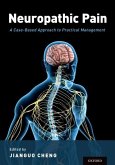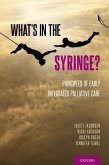- Broschiertes Buch
- Merkliste
- Auf die Merkliste
- Bewerten Bewerten
- Teilen
- Produkt teilen
- Produkterinnerung
- Produkterinnerung
This new edition of Antiseizure Medications: A Clinician's Manual reflects the advances in the study and treatment of epilepsy in the past several years. As a practical tool for physicians and other healthcare providers, this text focuses on the selection and use of antiseizure medications in a variety of clinical contexts.
Andere Kunden interessierten sich auch für
![Neuropathic Pain Neuropathic Pain]() Neuropathic Pain189,99 €
Neuropathic Pain189,99 €![Psychedelics Psychedelics]() David NuttPsychedelics16,99 €
David NuttPsychedelics16,99 €![Dermatologic Medications Dermatologic Medications]() Marguerite Rush LernerDermatologic Medications21,99 €
Marguerite Rush LernerDermatologic Medications21,99 €![Psychedelics as Psychiatric Medications Psychedelics as Psychiatric Medications]() Psychedelics as Psychiatric Medications35,99 €
Psychedelics as Psychiatric Medications35,99 €![A Field Manual for Palliative Care in Humanitarian Crises A Field Manual for Palliative Care in Humanitarian Crises]() A Field Manual for Palliative Care in Humanitarian Crises54,99 €
A Field Manual for Palliative Care in Humanitarian Crises54,99 €![Preoperative Optimization of the Chronic Pain Patient Preoperative Optimization of the Chronic Pain Patient]() Heath B McAnallyPreoperative Optimization of the Chronic Pain Patient82,99 €
Heath B McAnallyPreoperative Optimization of the Chronic Pain Patient82,99 €![What's in the Syringe? What's in the Syringe?]() Juliet JacobsenWhat's in the Syringe?51,99 €
Juliet JacobsenWhat's in the Syringe?51,99 €-
-
-
This new edition of Antiseizure Medications: A Clinician's Manual reflects the advances in the study and treatment of epilepsy in the past several years. As a practical tool for physicians and other healthcare providers, this text focuses on the selection and use of antiseizure medications in a variety of clinical contexts.
Hinweis: Dieser Artikel kann nur an eine deutsche Lieferadresse ausgeliefert werden.
Hinweis: Dieser Artikel kann nur an eine deutsche Lieferadresse ausgeliefert werden.
Produktdetails
- Produktdetails
- Verlag: Oxford University Press
- 3rd edition
- Seitenzahl: 336
- Erscheinungstermin: 30. September 2022
- Englisch
- Abmessung: 203mm x 126mm x 17mm
- Gewicht: 404g
- ISBN-13: 9780197541210
- ISBN-10: 0197541216
- Artikelnr.: 65951194
- Herstellerkennzeichnung
- Libri GmbH
- Europaallee 1
- 36244 Bad Hersfeld
- gpsr@libri.de
- Verlag: Oxford University Press
- 3rd edition
- Seitenzahl: 336
- Erscheinungstermin: 30. September 2022
- Englisch
- Abmessung: 203mm x 126mm x 17mm
- Gewicht: 404g
- ISBN-13: 9780197541210
- ISBN-10: 0197541216
- Artikelnr.: 65951194
- Herstellerkennzeichnung
- Libri GmbH
- Europaallee 1
- 36244 Bad Hersfeld
- gpsr@libri.de
Ali A. Asadi-Pooya, M.D. Professor of Epileptology Director, Epilepsy Research Center, Shiraz University of Medical Sciences Jefferson Comprehensive Epilepsy Center, Department of Neurology, Thomas Jefferson University Michael R. Sperling, MD Baldwin Keyes Professor of Neurology Director, Jefferson Comprehensive Epilepsy Center Vice Chair for Research, Department of Neurology, Thomas Jefferson University
* 1. Diagnosis and Evaluation of Patients With Seizures
* 2. Antiseizure Medications Dosage Forms and Administration Guidelines
* 3. Mechanisms of Action and Pharmacokinetic Properties of Antiseizure
Medications
* 4. Monitoring Antiseizure Medications and Their Toxicity
* 5. Choices of Antiseizure Medications Based on Specific Epilepsy
Syndromes and Seizure Types
* 6. Clinically Important Drug Interactions With Antiseizure
Medications
* 7. Aggravation of Seizures by Antiseizure Medications
* 8. Polytherapy With Antiseizure Medications
* 9. Antiseizure Medications in Pregnancy
* 10. Antiseizure Medications in Lactating Women
* 11. Antiseizure Medications in the Elderly
* 12. Antiseizure Medications in Patients With Renal Disease
* 13. Antiseizure Medications in Patients With Liver Disease
* 14. Antiseizure Medications and Metabolic Disorders
* 15. Antiseizure Medications in Patients With Hyperlipidemia
* 16. Antiseizure Medications in Patients With Diabetes Mellitus
* 17. Antiseizure Medications in Patients With Cardiovascular Disorders
* 18. Antiseizure Medications in Patients With Hematological Disorders
* 19. Antiseizure Medications in Patients on Chemotherapy or
Immunosuppressive Therapy
* 20. Antiseizure Medications in Patients with Brain Tumors
* 21. Antiseizure Medications in Patients With Stroke
* 22. Antiseizure Medications in Patients With Multiple Sclerosis
* 23. Antiseizure Medications in Patients With Preexisting Psychiatric
Problems
* 24. Antiseizure Medications and Cognition
* 25. Antiseizure Medications in Patients With Migraine Headaches
* 26. Antiseizure Medications in Patients With Neuropathic Pain
Syndromes
* 27. Antiseizure Medications and Cutaneous Reactions
* 28. Antiseizure Medications and Ophthalmologic Problems
* 29. Antiseizure Medications and Weight Change
* 30. Antiseizure Medications and Bone Health
* 31. Antiseizure Medications in Patients With HIV Infection/AIDS
* 32. Antiseizure Medications in Patients With Coronavirus Infections
* 33. Antiseizure Medications in the Pipeline
* 2. Antiseizure Medications Dosage Forms and Administration Guidelines
* 3. Mechanisms of Action and Pharmacokinetic Properties of Antiseizure
Medications
* 4. Monitoring Antiseizure Medications and Their Toxicity
* 5. Choices of Antiseizure Medications Based on Specific Epilepsy
Syndromes and Seizure Types
* 6. Clinically Important Drug Interactions With Antiseizure
Medications
* 7. Aggravation of Seizures by Antiseizure Medications
* 8. Polytherapy With Antiseizure Medications
* 9. Antiseizure Medications in Pregnancy
* 10. Antiseizure Medications in Lactating Women
* 11. Antiseizure Medications in the Elderly
* 12. Antiseizure Medications in Patients With Renal Disease
* 13. Antiseizure Medications in Patients With Liver Disease
* 14. Antiseizure Medications and Metabolic Disorders
* 15. Antiseizure Medications in Patients With Hyperlipidemia
* 16. Antiseizure Medications in Patients With Diabetes Mellitus
* 17. Antiseizure Medications in Patients With Cardiovascular Disorders
* 18. Antiseizure Medications in Patients With Hematological Disorders
* 19. Antiseizure Medications in Patients on Chemotherapy or
Immunosuppressive Therapy
* 20. Antiseizure Medications in Patients with Brain Tumors
* 21. Antiseizure Medications in Patients With Stroke
* 22. Antiseizure Medications in Patients With Multiple Sclerosis
* 23. Antiseizure Medications in Patients With Preexisting Psychiatric
Problems
* 24. Antiseizure Medications and Cognition
* 25. Antiseizure Medications in Patients With Migraine Headaches
* 26. Antiseizure Medications in Patients With Neuropathic Pain
Syndromes
* 27. Antiseizure Medications and Cutaneous Reactions
* 28. Antiseizure Medications and Ophthalmologic Problems
* 29. Antiseizure Medications and Weight Change
* 30. Antiseizure Medications and Bone Health
* 31. Antiseizure Medications in Patients With HIV Infection/AIDS
* 32. Antiseizure Medications in Patients With Coronavirus Infections
* 33. Antiseizure Medications in the Pipeline
* 1. Diagnosis and Evaluation of Patients With Seizures
* 2. Antiseizure Medications Dosage Forms and Administration Guidelines
* 3. Mechanisms of Action and Pharmacokinetic Properties of Antiseizure
Medications
* 4. Monitoring Antiseizure Medications and Their Toxicity
* 5. Choices of Antiseizure Medications Based on Specific Epilepsy
Syndromes and Seizure Types
* 6. Clinically Important Drug Interactions With Antiseizure
Medications
* 7. Aggravation of Seizures by Antiseizure Medications
* 8. Polytherapy With Antiseizure Medications
* 9. Antiseizure Medications in Pregnancy
* 10. Antiseizure Medications in Lactating Women
* 11. Antiseizure Medications in the Elderly
* 12. Antiseizure Medications in Patients With Renal Disease
* 13. Antiseizure Medications in Patients With Liver Disease
* 14. Antiseizure Medications and Metabolic Disorders
* 15. Antiseizure Medications in Patients With Hyperlipidemia
* 16. Antiseizure Medications in Patients With Diabetes Mellitus
* 17. Antiseizure Medications in Patients With Cardiovascular Disorders
* 18. Antiseizure Medications in Patients With Hematological Disorders
* 19. Antiseizure Medications in Patients on Chemotherapy or
Immunosuppressive Therapy
* 20. Antiseizure Medications in Patients with Brain Tumors
* 21. Antiseizure Medications in Patients With Stroke
* 22. Antiseizure Medications in Patients With Multiple Sclerosis
* 23. Antiseizure Medications in Patients With Preexisting Psychiatric
Problems
* 24. Antiseizure Medications and Cognition
* 25. Antiseizure Medications in Patients With Migraine Headaches
* 26. Antiseizure Medications in Patients With Neuropathic Pain
Syndromes
* 27. Antiseizure Medications and Cutaneous Reactions
* 28. Antiseizure Medications and Ophthalmologic Problems
* 29. Antiseizure Medications and Weight Change
* 30. Antiseizure Medications and Bone Health
* 31. Antiseizure Medications in Patients With HIV Infection/AIDS
* 32. Antiseizure Medications in Patients With Coronavirus Infections
* 33. Antiseizure Medications in the Pipeline
* 2. Antiseizure Medications Dosage Forms and Administration Guidelines
* 3. Mechanisms of Action and Pharmacokinetic Properties of Antiseizure
Medications
* 4. Monitoring Antiseizure Medications and Their Toxicity
* 5. Choices of Antiseizure Medications Based on Specific Epilepsy
Syndromes and Seizure Types
* 6. Clinically Important Drug Interactions With Antiseizure
Medications
* 7. Aggravation of Seizures by Antiseizure Medications
* 8. Polytherapy With Antiseizure Medications
* 9. Antiseizure Medications in Pregnancy
* 10. Antiseizure Medications in Lactating Women
* 11. Antiseizure Medications in the Elderly
* 12. Antiseizure Medications in Patients With Renal Disease
* 13. Antiseizure Medications in Patients With Liver Disease
* 14. Antiseizure Medications and Metabolic Disorders
* 15. Antiseizure Medications in Patients With Hyperlipidemia
* 16. Antiseizure Medications in Patients With Diabetes Mellitus
* 17. Antiseizure Medications in Patients With Cardiovascular Disorders
* 18. Antiseizure Medications in Patients With Hematological Disorders
* 19. Antiseizure Medications in Patients on Chemotherapy or
Immunosuppressive Therapy
* 20. Antiseizure Medications in Patients with Brain Tumors
* 21. Antiseizure Medications in Patients With Stroke
* 22. Antiseizure Medications in Patients With Multiple Sclerosis
* 23. Antiseizure Medications in Patients With Preexisting Psychiatric
Problems
* 24. Antiseizure Medications and Cognition
* 25. Antiseizure Medications in Patients With Migraine Headaches
* 26. Antiseizure Medications in Patients With Neuropathic Pain
Syndromes
* 27. Antiseizure Medications and Cutaneous Reactions
* 28. Antiseizure Medications and Ophthalmologic Problems
* 29. Antiseizure Medications and Weight Change
* 30. Antiseizure Medications and Bone Health
* 31. Antiseizure Medications in Patients With HIV Infection/AIDS
* 32. Antiseizure Medications in Patients With Coronavirus Infections
* 33. Antiseizure Medications in the Pipeline








